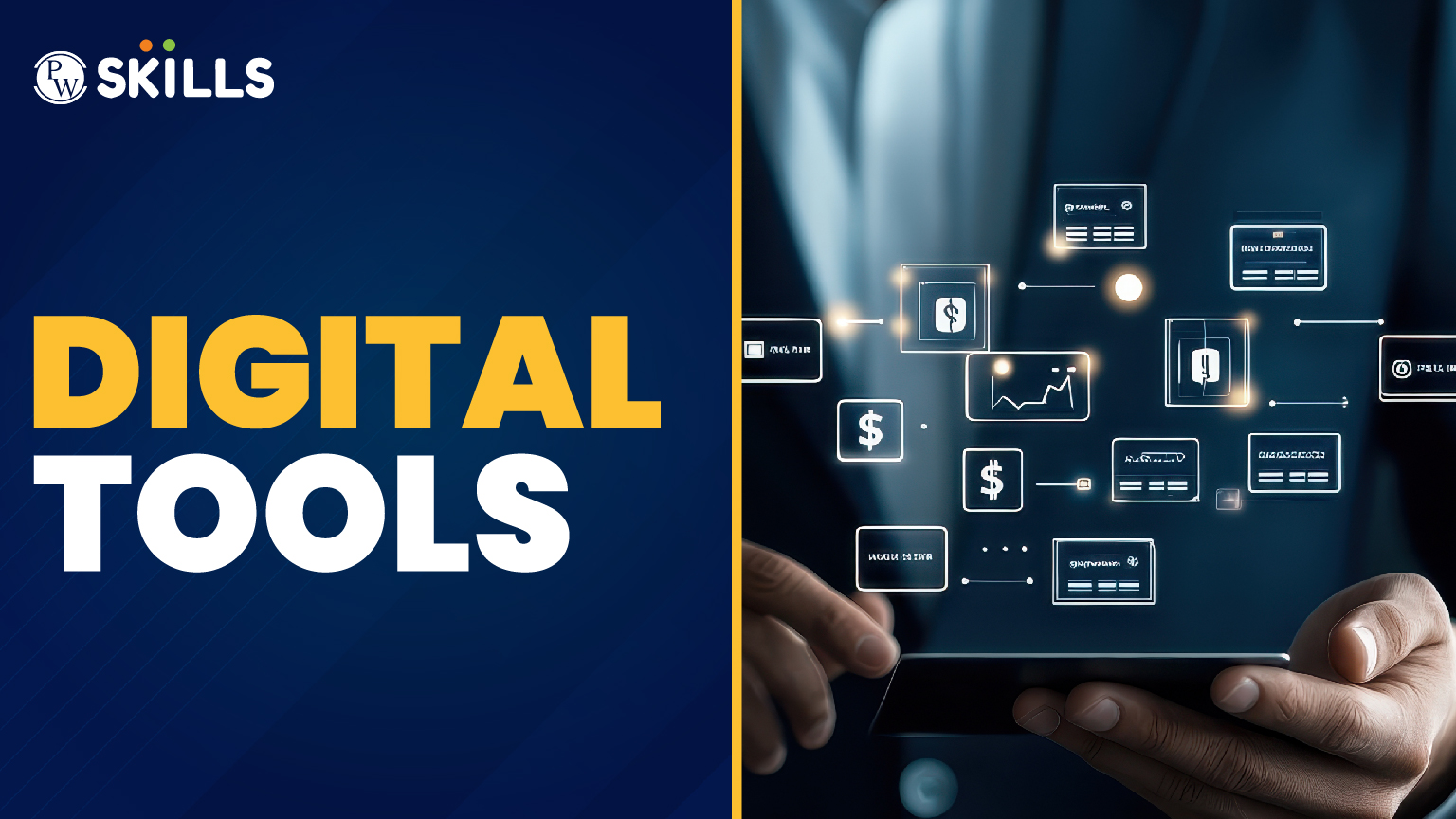Digital tools play a key role in how we work, communicate, and manage tasks today. Whether it’s organizing projects, scheduling content, or analyzing data, these tools help make complex work simple and efficient. Teams can now stay connected, share updates in real-time, and get things done faster without confusion.
Instead of spending time on repetitive tasks or chasing updates, digital tools help automate work and keep everything in one place. From marketers to educators to business owners, everyone relies on digital tools to improve results and stay productive. They help reduce errors, track progress, and support better decision-making.
Whether you are a student, business owner, or marketer, digital tools help boost productivity and support better results. They are useful in daily work, learning, and online marketing. Learn more about digital tools, types, examples, how to find the right ones, why they are important, and more below.
What are Digital Tools?
Digital tools are software programs, apps, or online platforms that help individuals and businesses work smarter in a digital environment. These tools make everyday tasks easier, faster, and more organized.
They include simple tools like word processors and spreadsheets, as well as advanced tools for project management, content creation, communication, and data analysis. Digital tools are essential for boosting productivity, improving collaboration, and staying efficient in both personal and professional workspaces.
Types of Digital Tools
Digital tools are used to simplify tasks, improve teamwork, and boost productivity in both work and learning environments. They are grouped into different types based on what they help you do. The following are the main types:
1. Productivity Tools: These help manage tasks, time, and documents.
- Examples: Google Workspace, Microsoft Office 365, Notion
- Use: Writing documents, taking notes, scheduling tasks, and organizing work.
2. Communication & Collaboration Tools: These support real-time messaging, meetings, and teamwork.
- Examples: Zoom, Microsoft Teams, Slack
- Use: Video calls, chatting, sharing files, and working together remotely.
3. Data Analytics & Reporting Tools: These tools analyze and present data to support better decisions.
- Examples: Google Analytics, Power BI, Tableau
- Use: Track performance, create reports, and spot trends.
4. Marketing & Social Media Tools: These manage campaigns and online presence.
- Examples: Mailchimp, HubSpot, Buffer
- Use: Plan posts, send emails, and track marketing performance.
5. E-commerce & CRM Tools: Used to handle sales and customer relationships.
- Examples: Shopify, Zoho CRM, Salesforce
- Use: Run online stores, track customer info, and manage sales.
6. Cloud Storage & File Management Tools: These store and organize files online.
- Examples: Google Drive, Dropbox, OneDrive
- Use: Share documents, backup files, and access from anywhere.
7. Educational & Learning Tools: Support online learning and training.
- Examples: Moodle, Kahoot!, Coursera
- Use: Take courses, give quizzes, and create learning content.
These digital tools are helpful in schools, offices, and businesses to make tasks easier and more efficient.
How to Find the Best Digital Tools for Marketing?
Finding the right digital tools for marketing is not just about selecting popular software. It requires a thoughtful approach based on your business goals, needs, and budget. Digital tools help improve efficiency, track performance, and automate marketing tasks, so choosing the right ones is essential for success.
Step 1: Define Your Marketing Goals
Start by identifying your specific marketing objectives. You may want to increase website traffic, improve SEO rankings, automate email campaigns, or boost social media engagement. Clear goals will help you choose the right tools, whether they are for SEO, email marketing, content creation, or analytics.
Step 2: Use Free Trials or Freemium Plans
Many tools offer free versions or trial periods. These allow you to test features, understand how the tool works, and decide if it fits your workflow. For example, some tools allow limited access to email marketing, design, or keyword research features at no cost.
Step 3: Check Features and Ease of Use
Choose tools that are user-friendly, easy to learn, and offer key features like automation, reporting, and integration with other platforms. It’s also helpful if the tool can work with your existing website, CRM, or analytics system.
Step 4: Look for Scalability
As your business grows, your tools should grow with you. Look for software that allows you to upgrade features, add team members, or expand functionality over time. Flexible pricing plans are also important to support your future needs.
Step 5: Read Reviews and Real-User Feedback
Before making a final decision, read reviews from other users, case studies from similar businesses, or comparison articles. This helps you avoid tools that may have hidden issues or do not meet expectations.
Step 6: Compare Cost and ROI
Understand your budget and compare tools based on the value they provide. Some tools may seem expensive at first but offer better long-term benefits through improved performance and time savings. Choose options that provide a good return on investment.
By following these steps, you can confidently select the best digital marketing tools that support your goals and help you work more effectively.
Examples of Digital Tools
Digital tools are used across different areas like communication, task management, content creation, marketing, and storage. Below are examples of digital tools grouped by their use and purpose:
1. Communication & Collaboration Tools
These help teams talk, share files, and work together online.
- Microsoft Teams: For team meetings, chats, and file sharing.
- Google Workspace: Offers Gmail, Google Docs, Meet, and Drive for team collaboration.
- Zoom: Used for video calls, webinars, and virtual meetings.
- Slack: Messaging platform with organized channels and app integrations.
2. Project & Task Management Tools
These tools help plan work, track tasks, and manage deadlines.
- Trello: Uses boards and cards for visual task management.
- Asana: Helps organize projects with timelines and task lists.
- Notion: All-in-one workspace for notes, calendars, and task tracking.
![]() Join Our Digital Marketing WhatsApp Channel
Join Our Digital Marketing WhatsApp Channel
3. Marketing & Analytics Tools
Used for running campaigns and tracking user data.
- Google Analytics: Tracks website traffic and user behavior.
- HubSpot: Manages emails, leads, and marketing automation.
- Mailchimp: For email campaigns and audience segmentation.
- Google Data Studio: Creates reports and visual dashboards.
4. Content Creation & Management Tools
Help in designing, writing, and publishing digital content.
- Canva: Design graphics and presentations easily with templates.
- WordPress: Build and manage websites or blogs.
- Figma: Design user interfaces and collaborate in real time.
5. Cloud Storage & File Sharing Tools
Used to save and share files online securely.
- Dropbox: Stores and syncs files with sharing options.
- Google Drive: Offers cloud storage and file collaboration.
These digital tools make work faster, easier, and more organized in today’s digital world.
Why are Digital Tools Important?
Digital tools are important because they help individuals and businesses work more efficiently, communicate better, and make smarter decisions. They automate tasks, save time, and reduce errors in daily work. Tools like project managers, communication platforms, and analytics software improve teamwork, productivity, and planning.
They also support creativity through content creation tools and help in learning through educational apps. In today’s digital world, using the right digital tools is essential for staying organized, competitive, and adaptable.
🧠 General Digital Marketing
- Introduction to Digital Marketing
- Digital Marketing Basics
- Digital Marketing Strategy
- What is Digital Marketing?
- Digital Marketing Explanation
- What are the 4 Types of Digital Marketing?
- Digital & Social Media Marketing
- Digital Marketing Services
- Digital Marketing Plan
- Digital Marketing Course & Placement
- Digital Marketing Modules
- Digital Marketing Jobs in India
- Digital Marketing Firms
- Top 20 Digital Marketing Interview Questions (2025)
- 15 AI Tools to Supercharge Digital Marketing
- Digital Marketing Books
- Digital Tools
- Digital Platform
- Learn Digital Marketing
- Digital Marketing Tutorial
- How Does Digital Marketing Work
- Components of Digital Marketing
- Digital Marketing What Is
- Kinds of Digital Marketing
- Digital Marketing Types
- Marketing Digital Marketing
- Digital Marketing Marketing
- Father of Digital Marketing
- Traditional Marketing vs Digital Marketing
- Digital Marketing Examples
Also Read:
- Top 10 Digital Marketing Books for New Digital Marketers, Importance for Beginners
- Top 7 AI Tools Helping Beginners Earn ₹1,000+ Per Day Online in 2025
- Top 10 Content Marketing Tools For 2025, and How They Help
- SEO Copywriting, What It Is, How to Do It, Career, Tools
Learn Digital Marketing with PW Skills
Digital Marketing with AI course by PW Skills teaches key skills like SEO, social media, paid ads, and analytics. It includes hands-on lessons to help you learn faster.
This digital marketing course online focuses on using AI in digital marketing to improve results. It’s suitable for beginners or professionals looking to study digital marketing online. Join today!
Digital Tools FAQs
What are digital tools?
Digital tools are software or online platforms that help users complete tasks more easily, such as writing, designing, managing projects, or learning.
Is a laptop a digital tool?
Yes, a laptop is a digital tool because it allows users to use software, browse the internet, and do digital work like editing, coding, or communicating.
What are some examples of digital learning tools?
Examples of digital learning tools include Google Classroom, Zoom, Kahoot!, Duolingo, and Edmodo. These help with online teaching, learning, and student engagement.
What are 5 digital devices?
Five digital devices are smartphones, laptops, tablets, digital cameras, and smart TVs. These are used for communication, media, work, and entertainment.
Is YouTube a digital tool?
Yes, YouTube is a digital tool used for learning, sharing videos, marketing, and entertainment. It supports both personal use and educational purposes.


